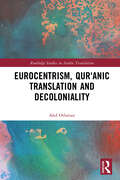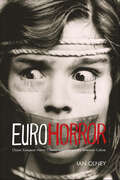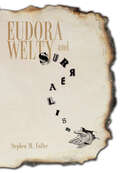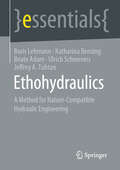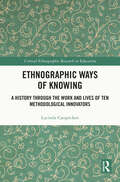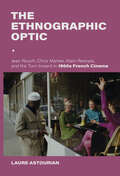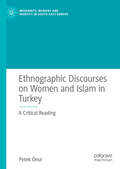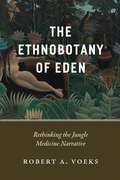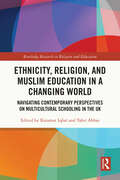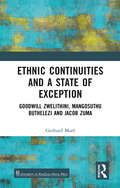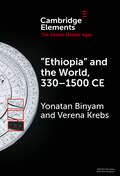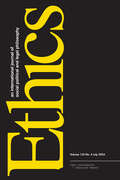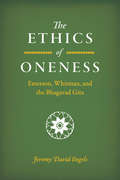- Table View
- List View
Eurocentrism, Qurʾanic Translation and Decoloniality (Routledge Studies in Arabic Translation)
by Ahd OthmanEurocentrism, Qurʾanic Translation and Decoloniality contributes to the understanding of Eurocentrism in Translation Studies and engages with the concept through the lens of scholarship on Arabic and Qurʾan translation.This book calls for a deeper consideration of Eurocentrism as essential for several debates in the discipline, including its scientific character and future development. It claims that the angle of Arabic and Qurʾan translation is a valuable – and nearly unexploited – area where tensions in translation scholarship can play out in revealing ways. The book also draws connections between Eurocentrism, Qurʾan translation and decolonial thought in order to highlight ‘decoloniality’ as a useful framework for imagining a post-Eurocentric discipline.The book will appeal to scholars and postgraduate students and researchers interested in Translation Studies, particularly within the areas of Arabic, Qurʾanic, Islamic and religious translation.
Euro Horror: Classic European Horror Cinema in Contemporary American Culture (New Directions in National Cinemas)
by Ian OlneyBeginning in the 1950s, "Euro Horror" movies materialized in astonishing numbers from Italy, Spain, and France and popped up in the US at rural drive-ins and urban grindhouse theaters such as those that once dotted New York's Times Square. Gorier, sexier, and stranger than most American horror films of the time, they were embraced by hardcore fans and denounced by critics as the worst kind of cinematic trash. In this volume, Olney explores some of the most popular genres of Euro Horror cinema—including giallo films, named for the yellow covers of Italian pulp fiction, the S&M horror film, and cannibal and zombie films—and develops a theory that explains their renewed appeal to audiences today.
Eureka Math 2™, [Grade] 4, Learn: Fractional Units, Module 6: Angle Measurements and Plane Figures
by Great MindsNIMAC-sourced textbook
Eureka Math 2™, [Grade] 4, Learn: Fractional Units, Module 5: Place Value Concepts for Decimal Fractions
by Great MindsNIMAC-sourced textbook
Eureka Math 2™, [Grade] 4, Learn: Fractional Units, Module 4: Foundations for Fraction Operations
by Great MindsNIMAC-sourced textbook
Eureka Math 2™, [Grade] 4, Learn: Fractional Units, Module 3: Multiplication and Division of Multi-Digit Numbers
by Great MindsNIMAC-sourced textbook
Eureka Math 2™, [Grade] 4, Learn: Fractional Units, Module 2: Place Value Concepts for Multiplication and Division
by Great MindsNIMAC-sourced textbook
Eureka Math 2™, [Grade] 4, Learn: Fractional Units, Module 1: Place Value Concepts for Addition and Subtraction
by Great MindsNIMAC-sourced textbook
Eureka Math 2™, [Grade] 4, Apply: Fractional Units, Module 6: Angle Measurements and Plane Figures
by Great MindsNIMAC-sourced textbook
Eureka Math 2™, [Grade] 4, Apply: Fractional Units, Module 5: Place Value Concepts for Decimal Fractions
by Great MindsNIMAC-sourced textbook
Eureka Math 2™, [Grade] 4, Apply: Fractional Units, Module 4: Foundations for Fraction Operations
by Great MindsNIMAC-sourced textbook
Eureka Math 2™, [Grade] 4, Apply: Fractional Units, Module 3: Multiplication and Division of Multi-Digit Numbers
by Great MindsNIMAC-sourced textbook
Eureka Math 2™, [Grade] 4, Apply: Fractional Units, Module 2: Place Value Concepts for Multiplication and Division
by Great MindsNIMAC-sourced textbook
Eureka Math 2™, [Grade] 4, Apply: Fractional Units, Module 1: Place Value Concepts for Addition and Subtraction
by Great MindsNIMAC-sourced textbook
Eudora Welty and Surrealism
by Stephen M. FullerEudora Welty and Surrealism surveys Welty's fiction during the most productive period of her long writing life. The study shows how the 1930s witnessed surrealism's arrival in the United States largely through the products of its visual artists. Welty, a frequent traveler to New York City, where the surrealists exhibited, and a keen reader of magazines and newspapers that disseminated their work, absorbed and unconsciously appropriated surrealism's perspective in her writing. In fact, Welty's first solo exhibition of her photographs in 1936 took place next door to New York's premier venue for surrealist art. In a series of readings that collectively examine A Curtain of Green and Other Stories, The Wide Net and Other Stories, Delta Wedding, The Golden Apples, and The Bride of the Innisfallen and Other Stories, the book reveals how surrealism profoundly shaped Welty's striking figurative literature. Yet the influence of the surrealist movement extends beyond questions of style. The study's interpretations also foreground how her writing refracted surrealism as a historical phenomenon. Scattered throughout her stories are allusions to personalities allied with the movement in the United States, including figures such as Salvador Dalí, Elsa Schiaparelli, Caresse Crosby, Wallace Simpson, Cecil Beaton, Helena Rubinstein, Elizabeth Arden, Joseph Cornell, and Charles Henri Ford. Individuals such as these and others whom surrealism seduced often lead unorthodox and controversial lives that made them natural targets for moral opprobrium. Eschewing such parochialism, Welty borrowed the idiom of surrealism to develop modernized depictions of the South, a literary strategy that revealed not only cultural farsightedness but great artistic daring.
Ethohydraulics: A Method for Nature-Compatible Hydraulic Engineering (essentials)
by Beate Adam Boris Lehmann Ulrich Schwevers Katharina Bensing Jeffrey A. TuhtanEthohydraulics is the transdiscipline linking behavioural science (ethology) and flow behaviour (hydraulics). Ethohydraulic studies provide repeatable and scalable insights into the reactive behaviour of aquatic animals. The findings can be used to derive limits and guidelines as well as design specifications for the planning of hydraulic engineering facilities. In this essential book, the authors provide an overview of the fundamentals and methodological approaches of ethohydraulic investigations. In addition to real-world case studies, current developments and future advances are provided.This Springer essential is a translation of the original German 1ststedition essentials,Ethohydraulik by Boris Lehmann, published by Springer-Verlag GmbH Germany, part of Springer Nature in 2021. The translation was done with the help of artificial intelligence (machine translation by the service DeepL.com). A subsequent human revision was done primarily in terms of content, so that the book will read stylistically differently from a conventional translation. Springer Nature works continuously to further the development of tools for the production of books and on the related technologies to support the authors.
Ethnographic Ways of Knowing: A History Through the Work and Lives of Ten Methodological Innovators (Critical Ethnographic Research in Education)
by Lucinda CarspeckenDrawing on the works of ten scholars and public intellectuals ranging over 200 years, this book foregrounds ways of knowing that include but go beyond the cognitive.The book explores the work of Harriet Martineau, Jane Addams, W. E. B. Du Bois, Zora Neale Hurston, Ella Deloria, M. N. Srinivas, Barbara Myerhoff, Orlando Fals Borda, Ronald Takaki and Nawal El Saadawi. The author discusses their multifaceted ethnographic practices and argues that such practices are still under-acknowledged in contemporary research in comparison to cognition and categorization. These scholars were outsiders to their societies in a variety of ways. They highlighted power imbalances in the perception and representation of one group by another and brought direct experience, emotion, narrative, imagination, recognition, self-reflection, activism and cultural humility into their writing, in addition to rationality. The book engages with the authors and their ideas in the context of their times and places. It also reclaims them as methodological predecessors, noting their contributions to what educational ethnography has been and what it could be in the future.Expanding the canon of social research history and providing insight into unique methodological forms, this text will be valuable for scholars and postgraduate students with interests in ethnography, as well as the history of research, anthropology and qualitative methods more broadly.
The Ethnographic Optic: Jean Rouch, Chris Marker, Alain Resnais, and the Turn Inward in 1960s French Cinema (New Directions in National Cinemas)
by Laure AstourianThe Ethnographic Optic traces the surprising role of ethnography in French cinema in the 1960s and examines its place in several New Wave fictions and cinéma vérité documentaries during the final years of the French colonial empire. Focusing on prominent French filmmakers Jean Rouch, Chris Marker, and Alain Resnais, author Laure Astourian elucidates their striking pivot from centering their work on distant lands to scrutinizing their own French urban culture. As awareness of the ramifications of the shrinking empire grew within metropolitan France, these filmmakers turned inward what their similarly white, urban, bourgeois predecessors had long turned outward toward the colonies: the ethnographic gaze.Featuring some of the most canonical and best-loved films of the French tradition, such as Moi, un Noir, La jetée, and Muriel, this is an essential book for readers interested in national identity and cinema.
Ethnographic Discourses on Women and Islam in Turkey: A Critical Reading (Modernity, Memory and Identity in South-East Europe)
by Petek OnurThis book provides a meta-reading of how ethnographic discourses on women and Islam in Turkey have changed since their emergence in 1983. It analyses the published ethnographic works in three discursive periods and shows that paradigm shifts in social sciences, processes of neo-liberal globalization and globalization of Islamism as well as political, social, cultural and economic transformations at the local level shape these periods. As an exceptional example of modernization in the Middle East and the post-imperial states in South-East Europe, Turkey has been experiencing tensions between Islamic beliefs and practices and Westernization and secularization processes. Countless aspects of Muslim women’s lives appear as symbols and indicators in this society like in many other Muslim majority societies and to scholars of gender and women’s studies in discussing the faith-based patriarchy. Thus, this book exhibits the necessity of developing a critical perspective on ethnographic representations of Muslim women in Turkey.
The Ethnobotany of Eden: Rethinking the Jungle Medicine Narrative
by Robert A. VoeksIn the mysterious and pristine forests of the tropics, a wealth of ethnobotanical panaceas and shamanic knowledge promises cures for everything from cancer and AIDS to the common cold. To access such miracles, we need only to discover and protect these medicinal treasures before they succumb to the corrosive forces of the modern world. A compelling biocultural story, certainly, and a popular perspective on the lands and peoples of equatorial latitudes—but true? Only in part. In The Ethnobotany of Eden, geographer Robert A. Voeks unravels the long lianas of history and occasional strands of truth that gave rise to this irresistible jungle medicine narrative. By exploring the interconnected worlds of anthropology, botany, and geography, Voeks shows that well-intentioned scientists and environmentalists originally crafted the jungle narrative with the primary goal of saving the world’s tropical rainforests from destruction. It was a strategy deployed to address a pressing environmental problem, one that appeared at a propitious point in history just as the Western world was taking a more globalized view of environmental issues. And yet, although supported by science and its practitioners, the story was also underpinned by a persuasive mix of myth, sentimentality, and nostalgia for a long-lost tropical Eden. Resurrecting the fascinating history of plant prospecting in the tropics, from the colonial era to the present day, The Ethnobotany of Eden rewrites with modern science the degradation narrative we’ve built up around tropical forests, revealing the entangled origins of our fables of forest cures.
Ethnicity, Religion, and Muslim Education in a Changing World: Navigating Contemporary Perspectives on Multicultural Schooling in the UK (Routledge Research in Religion and Education)
by Tahir Abbas Karamat IqbalThis novel and contemporary anthology brings important topics about race, religion, and identity to the foreground to address the challenges facing Muslim schoolchildren today.Through interviews and case studies, the chapters explore topics such as multiethnic education, teacher diversity, and culturally responsive pedagogy, providing insights into necessary changes and ways to enhance schools. Taking into account cultural touchstones such as the Black Lives Matter movement and the Trojan Horse affair, the book argues for an urgent, transformative accommodation of Muslims to take place within schooling in order to improve the educational standards of Muslim children within the United Kingdom, including several chapters that focus on Muslim education in locations such as Yorkshire, Peterborough, High Wycombe, and Tower Hamlets, and further afield.This book will be of importance to scholars, researchers, and postgraduate students studying religious education, secondary education, and multicultural education more broadly. Policymakers interested in education policy and politics, as well as race and ethnicity in educational contexts, may potentially benefit from the volume.
Ethnic Continuities and a State of Exception: Goodwill Zwelithini, Mangosuthu Buthelezi and Jacob Zuma
by Gerhard MaréThis book alerts readers to the dangers of tradition as a formal, structured politics, which enriches a narrowly elite minority while overriding democratic rights, effecting a ‘state of exception’ for the governance of millions who are rendered as ‘subjects’ in South Africa. Gerhard Maré sets his focus on three powerful men – Goodwill Zwelithini, Mangosuthu Buthelezi and Jacob Zuma – to illustrate how, from different social locations, each has relied on claims to Zulu tradition to occupy powerful and financially rewarding positions.Print edition not for sale in Sub-Saharan Africa.
‘Ethiopia’ and the World, 330–1500 CE (Elements in the Global Middle Ages)
by null Yonatan Binyam null Verena KrebsThis Cambridge Element offers an interdisciplinary introduction to the histories of the Ethiopian and Eritrean highlands from late antiquity to the late medieval period, updating traditional Western academic perspectives. Early scholarship, often by philologists and religious scholars, upheld 'Ethiopia' as an isolated repository of ancient Jewish and Christian texts. This work reframes the region's history, highlighting the political, economic, and cultural interconnections of different kingdoms, polities, and peoples. Utilizing recent advancements in Ethiopian and Eritrean Studies as well as Medieval Studies, it reevaluates key instances of contact between 'Ethiopia' and the world of Afro-Eurasia, situating the histories of the Christian, Muslim, and local-religious or 'pagan' groups living in the Red Sea littoral and the Eritrean-Ethiopian highlands in the context of the Global Middle Ages.
Ethics, volume 134 number 4 (July 2024)
by EthicsThis is volume 134 issue 4 of Ethics. Ethics features scholarly work that covers a range of topics pertaining to moral, political, and legal philosophy from a variety of intellectual perspectives, including social and political theory, law, and economics. Articles in the journal present new theories, apply theory to contemporary moral issues, and focus on historical works that have significant implications for contemporary theory. In addition to major articles, Ethics publishes critical discussions, symposia, review essays, and book reviews.
The Ethics of Oneness: Emerson, Whitman, and the Bhagavad Gita
by Jeremy David EngelsWe live in an era defined by a sense of separation, even in the midst of networked connectivity. As cultural climates sour and divisive political structures spread, we are left wondering about our ties to each other. Consequently, there is no better time than now to reconsider ideas of unity. In The Ethics of Oneness, Jeremy David Engels reads the Bhagavad Gita alongside the works of American thinkers Ralph Waldo Emerson and Walt Whitman. Drawing on this rich combination of traditions, Engels presents the notion that individuals are fundamentally interconnected in their shared divinity. In other words, everything is one. If the lessons of oneness are taken to heart, particularly as they were expressed and celebrated by Whitman, and the ethical challenges of oneness considered seriously, Engels thinks it is possible to counter the pervasive and problematic American ideals of hierarchy, exclusion, violence, and domination.
